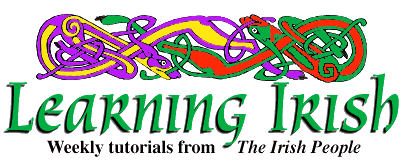
Irish Lesson 19
|
PRONUNCIATION PRONUNCIATION Two letter groups, "adh" and "agh", are usually pronounced (eye) when in accented syllables inside a word. Here are examples for "adh": adharc (EYE-uhrk), horn radharc (REYE-uhrk), sight Tadhg (teyeg), Tadhg, a man's name gadhar (GEYE-uhr), hound fadhb (feyeb), problem Some examples for "agh": aghaidh (EYE-ee), face laghad (LEYE-uhd), least slaghdán (SLEYE-daw*n), a cold, hay fever Ó Raghallaigh (oh REYE-lee), O'Reilly If the letter group "adh" is at a word end or in an unaccented syllable, it does not take the (eye) sound. For example: samhradh (SOU-ruh), summer; ionadh (OON-uh), wonder. Many verbal nouns are similar: dúnadh (DOON-uh), closing; briseadh (BRISH-uh), breaking; glanadh (GLUHN-uh), cleaning.
VOCABULARY Masculine Nouns néal, na néalta (nay*l, nuh NAY*L-tuh), cloud, the clouds biseach (BI-shahk*), recovery slaghdán (SLEYE-daw*n) a cold Feminine Nouns feoil, an fheoil (FYOH-il, un OH-il), meat, the meat beoir, an bheoir (BYOH-ir, un VYOH-ir), beer, the beer
bain, ag baineadh (bwin, uh BWIN-uh), cut, reap; also part of expressions such as "bain diot an cóta" (bwin DEE-uht un KOH-tuh), take off your coat. ith, ag ithe (i, eg I-he), eat ag ithe an aráin (un uh-RAW*-in), eating the bread ag ithe an bhricfeasta (vrik-FAS-tuh), eating the breakfast ag ithe mo lóin (muh LOH-in), eating my lunch ag ithe feola (FYOH-luh), eating meat ag ithe prátaí (PRAW*-tee), eating potatoes á ithe (aw* I-he), eating it á ithe sin, eating that á ithe seo, eating this Tá biseach orm (OH-ruhm), I am recovering cnag, ag cnagadh (kuh-NAHG, uh kuh-NAHG-uh), knock; as in "ag cnagadh ar an doras", knocking at the door ól, ag ól (ohl, eg OHL), drink ag ól bainne (BAHN-ye), drinking milk ag ól tae (tay*), drinking tea ag ól uisce (ISH-ke), drinking water ag ól caife (KAHF-e), drinking coffee ag ól mo chaife (muh K*AHF-e), drinking my coffee ag ól beorach (BYOH-ruhk*), drinking beer á ól (aw* ohl), drinking it á ól sin, drinking that á ól seo, drinking this féach, ag féachaint ar (FAY*-ahk, uh FAY*-uhk*-int er) looking at Tá slaghdán ort (OH-ruht), you have a cold NOTES ON VOCABULARY
CONVERSATION Nioclás (NEE-klaw*s): Éist (ay*sht)! Tá duine éigin ag cnagadh ar an doras (taw* DIN-e AY*-gin uh kuh-NAHG-uh er un DUH-ruhs). Listen! Someone is knocking on the door. Córa (KOH-ruh): Cé hé sin (kay* hay* shin) ag an doras? Who's that at the door? Seán: Seán anseo. Oscail an doras agus lig isteach sa teach mé. It's John here. Open the door and let me in the house. Tá sé ag cur báistí amuigh anseo (uh KUR BAW*SH-tee uh MWEE un-SHUH). It's raining out here. Nioclás: O, tá tú anseo faoi dheireadh (fwee YER-uh). Fan nóiméad, más é do thoil é (fahn NOH-may*d, MAW* shay* duh HIL ay*). -- Isteach leat, a Sheáin (ish-TYAHK* lat, uh HYAW*-in). Oh, you are here at last. Wait a minute please. -- In with you, John. Seán: Dia daoibh, a Niocláis agus a Chóra (DEE-uh yeev, uh NEE-klaw*sh AH-guhs uh K*OH-ruh). Hello, Nicholas and Cora. Córa: Dia's Muire duit, a Sheáin. Conas tá tú ar chor ar bith? (HUHR er bi) Hello, John. How are you, anyway? Seán: Tá me go maith, agus conas tá sibh (shiv) féin? I am well and how are you yourselves? Nioclás: Táimid go maith leis, ach tá slaghdán ar Chóra. We are well, too, but Cora has a cold. Córa: Tá biseach orm anois (uh-NISH), áfach (AW*-fuhk*). I am recovering now, however. Nioclás: Bain diot an cóta, a Sheáin. Take off your coat, John. Ina dhiaidh sin (in-uh YEE-uh shin), tar amach i seomra an bhidh (tahr uh-MAHK* i SHOHM-ruh un VEE), agus bíodh (BEE-ohk*) cupán tae agat (uh-GUHT). After that, come out into the dining room and have a cup of tea. Córa: Oíche dhorcha is ea í (EE-hye GUHR-uh-huh sha ee). Féach ar na néalta dubha (nuh NAY*L-tuh DOOV-uh). A dark night it is. Look at the black clouds. (c) 1997 The Irish People. May be reprinted with credit. |